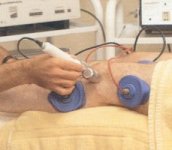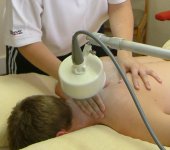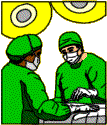What to Know
First of all you do not have to be referred for treatment by a doctor. You can
either call in to visit us and book an appointment or you can call in by phone.
Consultations are scheduled at 30 to 45 minutes, but infrequently can take
over an hour, so if you are attending for the first time make sure you put in
enough money to cover that period in the parking pay and display meter.
If you are nervous or think you will feel ill at ease, then please bring a
family member or close friend for moral support. We try to make you feel as
relaxed as possible.
 We know that some people feel rather self-conscious and vulnerable during the
physical examination particularly relating to certain conditions, so please
ask to be assessed or treated by someone of your own gender if that would make
you feel more comfortable.
We know that some people feel rather self-conscious and vulnerable during the
physical examination particularly relating to certain conditions, so please
ask to be assessed or treated by someone of your own gender if that would make
you feel more comfortable.
However, you cannot receive treatment without first having an assessment and
evaluation of your condition or injury (the Consultation). Even if you have
seen another therapist or consultant previously, we are ‘professionally obliged’
to re-evaluate your condition. This is to make sure that nothing has been
missed or over-looked in your previous treatment/evaluation, and is for your
safeguard and to give us a measure of your current condition. Sometimes you can benefit from another
perspective of an injury or condition.
Initial Consultation
After you have completed the registration/consent form, you will be taken
into one of the treatment rooms where you will be asked to take a seat whilst
we ask you lots of questions and take down details such as:
» how your injury or condition first appeared?
» how it has progressed?
» what treatment you have had and how it responded?
» what investigations have been done?
» how it is at the present?
» what it stops you doing and what you can still do with it?
We seem to ask lots of questions, some of them may not seem important or
relevant to you, but they may play a vital role in excluding something, and
in this way can help us to pinpoint more precisely not only what your problem
is, but also the likely cause!
 By the time we have completed this part of the assessment we should already
have a clear idea of what the problem is, and so the physical examination then
helps to confirm this by undertaking specialised tests, measurements and
manoeuvres to bring us to a final diagnosis.
By the time we have completed this part of the assessment we should already
have a clear idea of what the problem is, and so the physical examination then
helps to confirm this by undertaking specialised tests, measurements and
manoeuvres to bring us to a final diagnosis.
Sometimes an option of two or more diagnoses exists and you may require
further investigation with x-rays or a specialist referral for an MR scan or
other investigative procedure.
Once we have a diagnosis, we will explain the condition and the likely causes,
and the likely course of recovery with, if possible, a general idea of how
long it will take. It may be possible to split the recovery period into
stages reflecting either reduction in pain or, return to function, sport
or work.
We know that you won't retain all that we tell you on you first visit, so
don't hesitate in asking us again. The more you understand about your
condition or injury the smoother and faster your recovery.
 We usually have time to commence some form of treatment, though this may be
an abridged version of a full treatment session. The over-riding need is to
leave you with a clear strategy for your recovery. You will be advised on
both treatment and a programme of rehabilitation exercises to undertake at
home, and clear guidelines as to what it is reasonable for you to be able to
do and what to avoid doing so as not to interfere with and slow down the
recovery process.
We usually have time to commence some form of treatment, though this may be
an abridged version of a full treatment session. The over-riding need is to
leave you with a clear strategy for your recovery. You will be advised on
both treatment and a programme of rehabilitation exercises to undertake at
home, and clear guidelines as to what it is reasonable for you to be able to
do and what to avoid doing so as not to interfere with and slow down the
recovery process.
None of the exercise programmes we use should make your pain or condition
feel worse. If they do, we ask you to stop immediately and contact us.
The chances are that either we have given you an inappropriate exercise for your stage of recovery, or
that you have corrupted the exercise we have taught you, so please stop.
Sometimes, with your agreement, we feel the need to
refer you on to see a specialist or for investigations such as x-rays or MR
scan, or make recommendations to your doctor for stronger pain relief,
anti-inflammatory medication or pain modulating drugs. We write a concise
but comprehensive letter to your doctor summarising your complaint or
injury, diagnosis and proposed treatment.
Some patients do not want their doctor to know they have sought physiotherapy
treatment, or to have their injury or complaint detailed on their medical
records. We will respect their wishes in this regard but emphasise that if
a referral to a specialist is needed, the doctor will have to prepare a
referral letter and may question why he has not been notified at the outset.
Treatment Sessions
These are scheduled to last 30 minutes. We don't as a rule do any treatment that you could be doing yourself at home,
except to show you what or how to do it, or to check that you are doing it
correctly.
 Normally the session starts with a quick appraisal of how you are progressing,
how much better or if there has been a deterioration for any reason. There
may be a specific re-evaluation of certain physical tests to see whether
reported improvements or deterioration is in line with measurable clinical
findings. This helps us to modify your treatment protocol to ensure that your
recovery is taking place at the optimum pace. The treatment or exercise
programmes shouldn't be too aggressive or too gentle so as to be ineffective.
Normally the session starts with a quick appraisal of how you are progressing,
how much better or if there has been a deterioration for any reason. There
may be a specific re-evaluation of certain physical tests to see whether
reported improvements or deterioration is in line with measurable clinical
findings. This helps us to modify your treatment protocol to ensure that your
recovery is taking place at the optimum pace. The treatment or exercise
programmes shouldn't be too aggressive or too gentle so as to be ineffective.
Wherever possible any exercises that are prescribed will be given to you on
exercise sheets to take home as will any advice to do with use of heat/cold
or the use of pain relief or anti-inflammatory medication.
New Patient Information
If you are a new patient to Sport-Med or have never had physiotherapy
treatment before, then you may feel a bit nervous about attending for
physiotherapy treatment for the first time. We hope this information
will give you the confidence that your will be well looked after and
we will do all we can to help you to feel relaxed and at put you at ease.
We know that being in pain or being frustrated by a niggling injury makes
people up-tight and anxious.
 Some patients are worried that treatment is going to hurt them and cause more
pain and suffering. Well that is not the way we deliver treatments at Sport-Med.
We are acutely aware of how important it is to limit the amount of pain and
discomfort you are experiencing. Not just so that you feel better, but so that
we know we are working to off load stress or strain from pain sensitive
structures in the affected area.
Some patients are worried that treatment is going to hurt them and cause more
pain and suffering. Well that is not the way we deliver treatments at Sport-Med.
We are acutely aware of how important it is to limit the amount of pain and
discomfort you are experiencing. Not just so that you feel better, but so that
we know we are working to off load stress or strain from pain sensitive
structures in the affected area.
You will be greeted in our reception area and asked to fill out a
registration/consent form. Before the consultation commences you will be
required to sign the consent form to agree to receiving the assessment,
evaluation and treatment, and to agree to pay in full for professional
services rendered.
On the reverse side of this form is a medical check list that helps us to
make sure that we do not overlook any relevant medical details that don't
always come to light in the assessment and which may have implications to
the diagnosis or treatment.
It would help if you have the Doctor's name and Surgery name and address
(telephone no. if possible).
If you are a member of a private medical insurance plan, then the following
details would be helpful in processing your claim and managing your account:
» Name of the Insurance Company (or Brokers)
» Telephone number of Ins. Co
» Membership or Group Membership number
» Authorisation or Claim number
If you have already seen a medical professional previously and have records,
reports, x-rays or MR scans and their reports, then please bring them if
they are relevant to your condition or injury.
What Ifs ? Frequently Asked Questions
What if I need x-rays?
You can either get these done on the NHS or have them done privately.
If you go to your doctor (we'll usually send a covering letter in the post)
you can request an appointment for an x-ray at your local hospital. This can
take a few days, and you'll generally wait ten days before you get any results.
You'll only get a report and you won't have the x-rays to look at.
 If you have x-rays done privately we can often arrange to have these done on
the same day at a local radiographers. We complete a request form on your behalf.
The x-rays are taken and left for reporting by the radiologist. We often receive
the report the same day by fax and the x-rays arrive in the post the following
day for us to view and for you to take away with you if you want.
Joints like knee, ankle and wrist cost about £90 -110 whilst backs and necks can be
nearly £140, but you do tend to get a more comprehensive report and you actually
get to see the x-rays yourself, which are far more enlightening than the report itself..
If you have x-rays done privately we can often arrange to have these done on
the same day at a local radiographers. We complete a request form on your behalf.
The x-rays are taken and left for reporting by the radiologist. We often receive
the report the same day by fax and the x-rays arrive in the post the following
day for us to view and for you to take away with you if you want.
Joints like knee, ankle and wrist cost about £90 -110 whilst backs and necks can be
nearly £140, but you do tend to get a more comprehensive report and you actually
get to see the x-rays yourself, which are far more enlightening than the report itself..
What if I need an MR Scan?
If this is a scan of an extremity such as an ankle, knee, elbow or wrist then
this can be done on a small scanner in the North West (Preston) without the
need for referral by a specialist. It costs in the region of £190.00 and then
you have to pay for the MR scan to be reported on, and this may cost about £80.00
The quality of the scan is very good indeed, and is comparable to some of the
larger scanners in hospitals.
 If you need a scan of your back or neck to check for prolapsed disc or nerve
root compression, then this has to be done on the larger type of scanner. For
this you will first of all need to be referred to a specialist, as a
physiotherapist cannot make a referral. Recently your doctor can now make an
MR scan request so that a more informed decision can be made as to whether a
specialist referral is in fact necessary. In these circumstances we would
send a covering letter to your doctor requesting referral to see a specialist
and why we think you might benefit from a scan. We would also send a detailed
letter to the specialist outlining our examination findings and why we think
you might require further investigation.
If you need a scan of your back or neck to check for prolapsed disc or nerve
root compression, then this has to be done on the larger type of scanner. For
this you will first of all need to be referred to a specialist, as a
physiotherapist cannot make a referral. Recently your doctor can now make an
MR scan request so that a more informed decision can be made as to whether a
specialist referral is in fact necessary. In these circumstances we would
send a covering letter to your doctor requesting referral to see a specialist
and why we think you might benefit from a scan. We would also send a detailed
letter to the specialist outlining our examination findings and why we think
you might require further investigation.
Scans can be done on the NHS but this is entirely at the judgement of the
NHS specialist. Often the waiting list can be some weeks. Some people elect to
have a scan done privately rather than wait and this is available within 24
hours, 48 hours at a premium. Usually a scan within ten days is average time
to wait, but it may cost you £350 to £550.00. For those patients with cover on
a medical insurance plan, you should check that you are covered before
proceeding with the scan, but most policies cover this investigation. However,
you will often need the specialist referral for an MR scan if you are to claim
off your medical insurance programme.
What if I need to see a specialist?
First of all we will consult you and discuss the reasons and benefits from
seeking a specialist opinion. It might be for further investigation (MR scan)
or to see if the specialist thinks you are a suitable candidate for surgery.
We will write a progress letter to your doctor outlining the reasons we think
you need the referral either on the NHS or as a Private Patient.
In the NHS route we may recommend that you are referred to a particular
Specialists clinic, but you may not necessarily see that Specialist. You
may see one of his Registrars or a very highly trained physiotherapist.
You will still get excellent care and the appropriate investigations, but
you may have to wait a few weeks for the appointment unless your doctor
has a method of fast-tracking you as a very urgent case! If the specialist
thinks you need surgery, often you will be placed on a waiting list according
to the severity and urgency of your condition. This can vary from anything
between a week to many months.
 You can sometimes cut out some of the waiting time by seeing the specialist
privately in the first instance, to get his opinion on whether you need surgery.
This may cost in the region of £120 to £250 depending on whether you see an
orthopaedic surgeon or a Neurosurgeon.
You can sometimes cut out some of the waiting time by seeing the specialist
privately in the first instance, to get his opinion on whether you need surgery.
This may cost in the region of £120 to £250 depending on whether you see an
orthopaedic surgeon or a Neurosurgeon.
You must make it known to him that you want to be transferred to his NHS
clinic, but often you still have to wait the same amount of time, you just
know whether you need surgery, or should continue with rehabilitation, sooner.
The approximate costs of various common operations are given below as an
indication, should any uninsured person want to consider paying for surgery
themselves.
Knee arthroscopy £1,800 - £2,500
Knee replacement £8,500 - £10,000
Knee cruciate repair £3,750 - £4,800
Hernia repair £1,400 - £1,900
Carpal tunnel release £1,100 - £1,400
Hip replacement £7,200 - £10,000
Epidural injections £650 - £1,400
Joint steroid injections £120 - £150
What if I need blood tests?
In this situation blood tests can usually be done at your doctors surgery
and there is little benefit going privately. We commonly refer patients
back to their doctors for blood tests if we suspect Gout, Diabetes or a
Rheumatoid condition. Often the appropriate treatment is medication and
you will need to see your doctor for this anyway.
What if I need orthotics (corrective insoles)?
We have our in house Podiatrist with whom we can arrange an appointment.
If you are under 16 years and over 65 years old or have a disability you can
attend the Stepping Hill Podiatry Clinic or one of the satellite clinics at a
local Doctors Surgery. This is an NHS service and won't cost you anything,
but be prepared to wait a little while for your orthotics, and be aware that
economy can be a major factor in their prescription! We can give you a contact
number for this service if you require it.
Insurance Claims
If you can give us your medical insurance details, including registration
number and / or authorisation number, we can often receive settlement of your
account directly from the insurance company. You may need to complete a claim
for and often this will need to be authorised by your doctor or a specialist.
A few insurance companies such as BUPA do accept claim forms signed by the
Chartered Physiotherapist.
Please check that you are covered by your policy by giving the insurance
company or their agents a ring. It is useful to know whether there is a limit
on physiotherapy or out-patient cover and how much this is.
You will expect to cover any shortfall due to non-payment by the insurance
company as a result of a policy excess or limit on funds.
Some policies require that after six or eight sessions you must either return
to your doctor for re-authorisation, or get a referral to a specialist to
progress with further investigation or to recommend continuing with
physiotherapy treatment.
There may be an 'excess' on the policy, which will fall to you to settle
directly with us before your treatment is concluded.
Strapping and supports are not covered under the terms of many policies and
you may be required to pay for these separately.
Some insurance companies will cover the cost of bio-mechanical evaluation and
casting for orthotics, and the fitting and fine tuning of these once
manufactured, but they will not pay for the cost of the orthotics themselves.
The production cost is kept to a minimum, but you may have to pay for this
out of your own pocket (approx £50)
We can provide a list of all the medical insurance companies we deal with,
the numbers of each Hotline and our Provider number for each company,
to assist in the smooth running of your account.
Common insurance companies we deal with are as follows:
» Bupa
» PPP
» Norwich Union
» Standard Life
» Remedi
» Simply Health
If your insurance company is not listed here it is probably a sister company
or an agency for a larger company. Please let us have your details and we will
contact them to set up your account.
Top»
|


